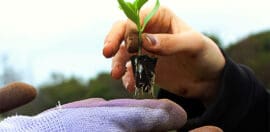Philanthropy leaders share insights into funding intentions and directions

2 July 2020 at 8:35 am
Watch the highlights from a two-part live show with five philanthropy sector leaders.
Over a two-part series on “Philanthropy directions and intentions during and post COVID-19”, five philanthropy sector leaders shared their experiences, insights, research, observations and advice as part of the RESET 2020 live programming series. Across two hours this last week, the leaders also answered 30-plus questions from the audience. Recent research from Philanthropy Australia was shared in detail, and the National Funding Platform was discussed at length, both of which provided great encouragement to funders and fund-seekers in attendance. Below is an extract of each leaders’ contribution at the shows, and the results from our live poll.
Live poll results
As with all RESET 2020 live shows, we asked organisations (both funders and fund-seekers) about their greatest challenges right now. The live poll found 72 per cent of fund-seekers don’t know which funders to engage with, and 33 per cent said they don’t have the skills to engage adequately; 34 per cent feel anxious about the future; 21 per cent of funders said their income was so uncertain that they were unsure what they could afford to distribute at the moment; and 10 per cent want to help organisations but are not sure where or how to start.
Sarah Davies AM, CEO of Philanthropy Australia
Sarah was able to share the findings of the Philanthropy Australia Funder Research which was based on responses of 101 trusts and foundations. She started by describing the response of the Australian philanthropic sector as “nothing short of inspirational”, reflecting on the notable difference between the response post global financial crisis and this current crisis, stating that philanthropy has responded incredibly strategically and bravely.
Sarah delved into the research, which found that 88 per cent of funders have changed or adapted granting and operating approaches in response to COVID-19; 60 per cent were now offering grants to new grant partners; 40 per cent of funders were engaging in advocacy on behalf of particular groups as part of their COVID-19 response; and despite 83 per cent saying the value of their corpus had declined as a result of economic instability, 50 per cent said they will still maintain or increase giving.
Jodi Kennedy, general manager of charitable trusts and philanthropy at Equity Trustees
Jodi reflected on agility, flexibility and adaptability, bringing the perspective of a trustee company managing hundreds of individual trusts and foundations. She spoke to the ways that Equity Trustees has adapted its traditional approach to funding, such as the first tranche of emergency funding – some $2.7 million in COVID-19 related “lifeline grants” to 70 organisations, covering practical requests such as technology solutions, service model repositioning, direct equipment requests and core funding support. She also spoke about the team having very open and honest discussions with partners, freeing up as much capital as possible, and being open-minded about what the sector might need in the coming year ahead.
Jodi also shared openly the current possible impacts for trusts and foundations’ income, potentially being impacted by as much as 30 to 40 per cent from level of FY19, she said the organisation was monitoring this situation closely.
Dr Catherine Brown OAM, CEO of Lord Mayor’s Charitable Foundation
Catherine shared the perspective of the Lord Mayor’s Charitable Foundation as a 97-year-old community foundation that was set up to help support the big challenges facing the Greater Melbourne community. While the foundation has a focus on the big issues of unemployment, education, social and affordable housing, climate change and others, it also has a disaster relief policy in place (supporting disasters since the 1930s), which has enabled the foundation to respond quickly with COVID-19. The foundation has been able to provide $1.6 million for COVID-19 response grants to date. Catherine gave examples of the types of projects it has been able to support, and reflected briefly on the opportunities into the future including renewables-led recovery and stimulus funding to increase the supply of social and affordable housing, both advanced and advocated through philanthropic support. Catherine has also been watching international foundations and how they are responding, sharing ground-breaking steps such as Ford Foundation and MacArthur Foundation taking out loans to increase their grantmaking ability.
Natalie Egleton, CEO of the Foundation for Rural & Regional Renewal (FRRR)
Natalie shared the perspective of rural and regional communities, the impacts of rolling disasters and COVID-19, the growth in partnerships with the private sector, and the opportunity for positive transformation at this time. The session saw a particular focus on the growing and very noticeable digital divide for rural communities. Natalie mentioned some of the upcoming grants program run by FRRR that organisations could look into, and also spoke about the ways that organisations without DGR1 status could partner with FRRR through their Not For Profit Fundraising Accounts, which help organisations gather donations and provide tax deductibility – an important and valuable support at this time.
Maree Sidey, CEO of Australian Communities Foundation (ACF)
Maree took us behind the scenes of the National Funding Platform, a response from Australian Communities Foundation and Philanthropy Australia to help coordinate the response to the COVID-19 pandemic. Over recent months, the platform has seen 300-plus COVID-19 related projects listed requesting $11 million of support since February 2020, with many grantmakers and funders using the platform to find organisations to support at this time. While ACF does not have visibility over all project funding through the platform, ACF’s team of five program managers has been busily connecting ACF’s donor community with projects, and has distributed more than $600,000 of grants to COVID affected organisations and communities.
The full recordings of the two-part series can be viewed here.
RESET 2020 live programming continues over July and August with organisation leaders sharing their stories of transformation, alongside subject matter specialists to answer your questions. Register for the updates here.







